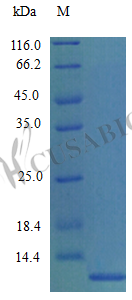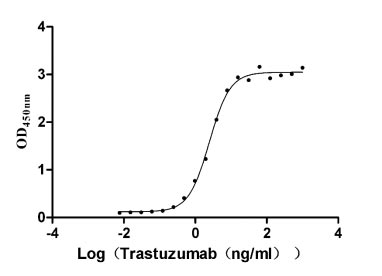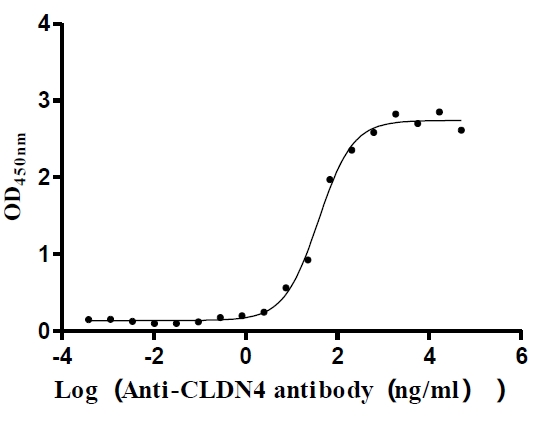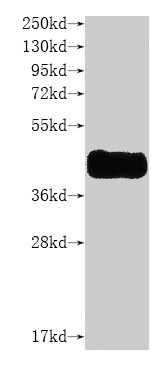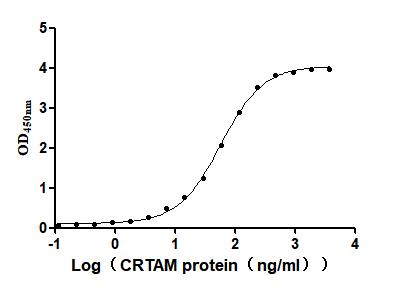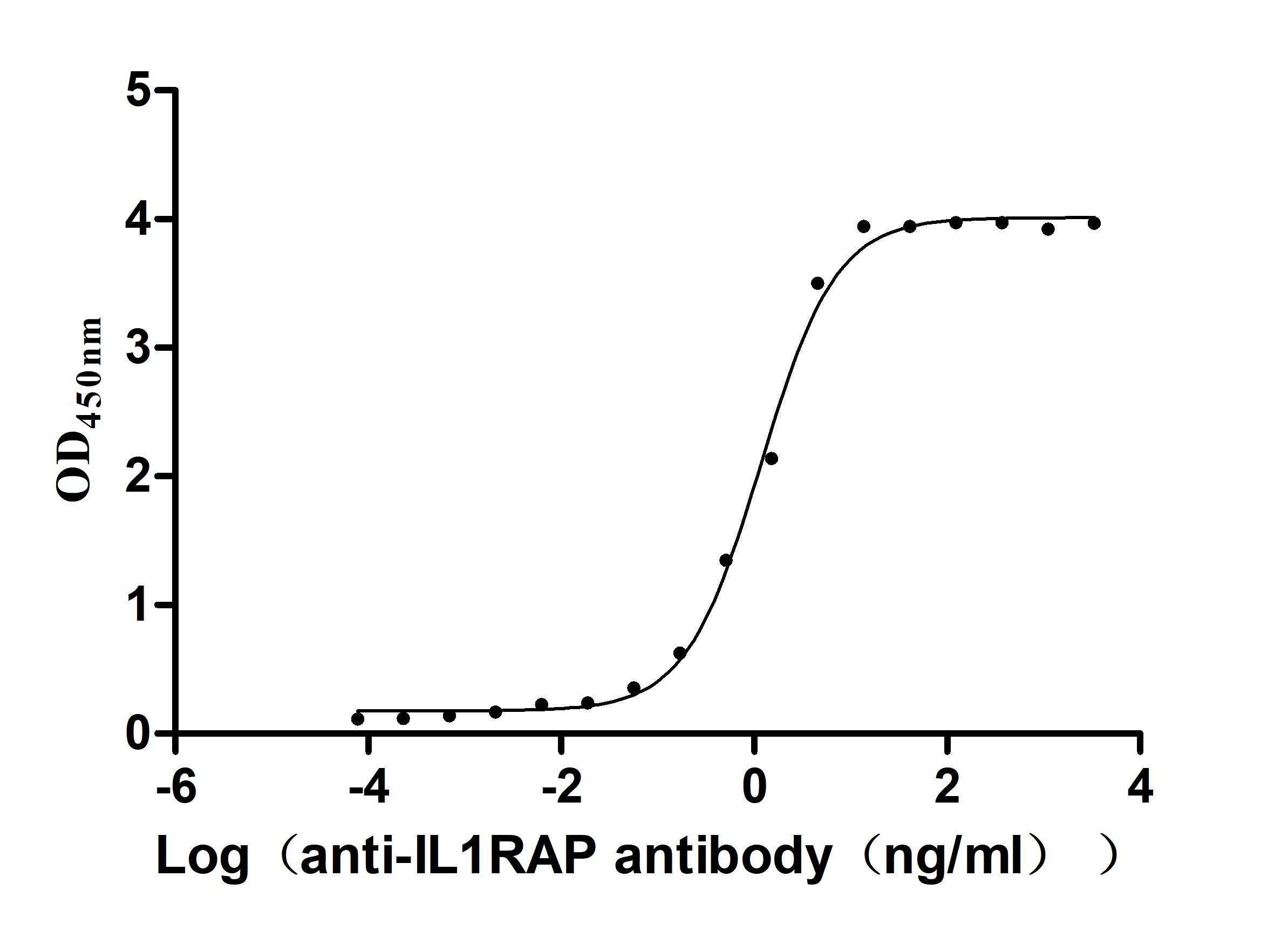Recombinant Mouse C-C motif chemokine 7 protein (Ccl7)
In Stock产品详情
-
纯度:>95% as determined by SDS-PAGE.
-
内毒素:Less than 1.0 EU/μg as determined by LAL method.
-
生物活性:Fully biologically active when compared to standard. The biologically active determined by a chemotaxis bioassay using human monocytes is in a concentration range of 100-300 ng/ml.
-
基因名:
-
Uniprot No.:
-
别名:Ccl7; Fic; Mcp3; Scya7C-C motif chemokine 7; Intercrine/chemokine MARC; Monocyte chemoattractant protein 3; Monocyte chemotactic protein 3; MCP-3; Protein FIC; Small-inducible cytokine A7
-
种属:Mus musculus (Mouse)
-
蛋白长度:Full Length of Mature Protein
-
来源:E.Coli
-
分子量:8.5 kDa
-
表达区域:24-97aa
-
氨基酸序列QPDGPNASTC CYVKKQKIPK RNLKSYRRIT SSRCPWEAVI FKTKKGMEVC AEAHQKWVEE AIAYLDMKTP TPKP
-
蛋白标签:Tag-Free
-
产品提供形式:Liquid or Lyophilized powder
Note: We will preferentially ship the format that we have in stock, however, if you have any special requirement for the format, please remark your requirement when placing the order, we will prepare according to your demand. -
缓冲液:0.2 μm filtered 2xPBS, pH 7.4 ,lyophilized
-
储存条件:Store at -20°C/-80°C upon receipt, aliquoting is necessary for mutiple use. Avoid repeated freeze-thaw cycles.
-
保质期:The shelf life is related to many factors, storage state, buffer ingredients, storage temperature and the stability of the protein itself.
Generally, the shelf life of liquid form is 6 months at -20°C/-80°C. The shelf life of lyophilized form is 12 months at -20°C/-80°C. -
货期:5-10 business days
-
Datasheet & COA:Please contact us to get it.
相关产品
靶点详情
-
功能:Chemotactic factor that attracts monocytes and eosinophils, but not neutrophils. Augments monocyte anti-tumor activity.
-
基因功能参考文献:
- The suppression of nasal inflammation due of IL-17A deficiency in allergic rhinitis is partly responsible for the regulation of CCL7 secretion and eosinophil infiltration, which may be regulated via the CCL7/CCR3 pathway. PMID: 28046055
- Our results demonstrate that CCL7 is required for maximal ovalbumin-induced ocular anaphylaxis, mast cell recruitment in vivo, and maximal FcepsilonRI-mediated mast cell activation in vitro PMID: 27956527
- Periprostatic adipocytes drive prostate cancer progression in obesity via CCL7 secretion which stimulates CCR3 expressing tumor cells. PMID: 26756352
- TFPI has an anti-proliferative role in TNF-alpha stimulated-VSMCs at least partly by interfering with the MCP-3/CCR2 pathway and then via suppression of the ERK1/2 and PI3K/AKT signaling pathways PMID: 26302185
- Our data highlight a pivotal role of CCL7 and IRF-7 in rhinovirus-induced inflammation PMID: 25847975
- CCL7 has a dual role in the development of renal tubular interstitial fibrosis, deleterious in early stages but beneficial during later stages PMID: 23872063
- These findings suggest that aortic MCP-3 overexpression may contribute to the development of atherosclerosis and hepatic steatosis under atherogenic conditions. PMID: 23462015
- An increase in the expression of MCP-3 along with IL-6 histone modification at the MCP-3 promoter promotes pain sensation associated with enhanced interaction between astrocytes and microglia in the spinal cord PMID: 23364351
- Electrical stimulation for 1 h significantly upregulates SDF-1 and MCP-3 expression that persists for 24 hours. PMID: 22006493
- Direct anal sphincter injury results in higher levels of SDF-1 and MCP-3 expression soon after injury, whereas denervation via pudendal nerve crush results in greater SDF-1 and MCP-3 expression 10 days after injury. PMID: 21706136
- Matrix metalloproteinase-2-mediated chemokine cleavage of MCP3 has an important role in cardiac inflammation as a negative feedback mechanism. PMID: 21986287
- expression of the chemokine, stromal cell-derived factor-1 (SDF-1) or monocyte chemotactic protein-3 (MCP-3) may enhance homing of osteogenic cells into sites of fracture repair PMID: 21567452
- CCL7 proteins were present in the vast majority of tissues investigated. mRNA for these proteins was also expressed in most of these tissues suggesting local production and the ability to respond in situ to inflammatory stimuli. PMID: 20931267
- MCP-3 is significantly over-expressed in the urethral tissues of both wild-type and obese mice immediately after any urethral manipulation. Underlying obesity resulted in alterations in response to tissue injury, paralleling the degree of injury. PMID: 20970834
- Monocyte chemoattractant protein-3 plays a critical role in mediating oxidative stress-induced neutrophilic airway inflammation and may have relevance in induction of neutrophilia in severe asthma. PMID: 11777981
- in study of relevance of chemokine expression to selective migration of t-cells and the disease localization in murine graft-versus-host disease, mcp3 was found to be predominantly expressed in skin and heart, and not spleen and liver. PMID: 12098066
- overexpression of MCP-3 in tight-skin mouse skin suggests a novel role for this protein as a fibrotic mediator activating extracellular matrix gene expression in addition to promoting leukocyte trafficking. PMID: 12847692
- These results indicate that CCR7-mediated cortex-to-medulla migration of thymocytes is essential for establishing central tolerance rather than for supporting the maturation or export of thymocytes. PMID: 16473829
- a novel mechanism for the recruitment of CCR10-positive T cells to skin-draining LN following the rapid release of preformed CCL27 from the epidermis. PMID: 18453562
- Cross-talk between MCP-3 and TGFbeta may be critical in the development of fibrosis. PMID: 19038247
- Up-regulated MCP-3 production does not compensate for loss of MCP-1; MCP-3 appears to be a less effective mediator of monocyte recruitment than MCP-1. PMID: 19641140
显示更多
收起更多
-
亚细胞定位:Secreted.
-
蛋白家族:Intercrine beta (chemokine CC) family
-
数据库链接:
KEGG: mmu:20306
STRING: 10090.ENSMUSP00000021011
UniGene: Mm.341574
Most popular with customers
-
Recombinant Human Receptor tyrosine-protein kinase erbB-2 (ERBB2), partial (Active)
Express system: Mammalian cell
Species: Homo sapiens (Human)
-
Recombinant Human Claudin-4 (CLDN4)-VLPs (Active)
Express system: Mammalian cell
Species: Homo sapiens (Human)
-
Recombinant Human C-C chemokine receptor type 8 (CCR8)-VLPs (Active)
Express system: Mammalian cell
Species: Homo sapiens (Human)
-
Recombinant Mouse Cytotoxic and regulatory T-cell molecule (Crtam), partial (Active)
Express system: Mammalian cell
Species: Mus musculus (Mouse)
-
Recombinant Human Interleukin-1 receptor accessory protein (IL1RAP), partial (Active)
Express system: Mammalian cell
Species: Homo sapiens (Human)

